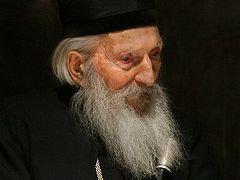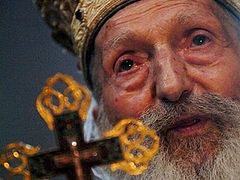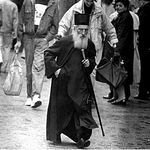 Patriarch Pavle Knowing about the veneration and love that the Orthodox faithful around the world have for Patriarch Pavle of Serbia, we invite readers to get acquainted with several recollections of this bright man, written by Archimandrite Jovan (Radosavlević), a contemporary, companion, and co-struggler with the late Patriarch. In his youth, during the war, he met Gojko Stojčević—the name of the future Patriarch—at a Serbian monastery. From that time, they were linked by a strong friendship, which Fr. Jovan remembers fondly and gratefully. The episodes from the life of Patriarch Pavle that he here acquaints readers with are sad and dangerous, joyful and humorous, showing calmness, trust, and love for Christ and the people, who helped not only the Serbian ascetic and his contemporaries, but also their descendants. Here are a few such episodes.
Patriarch Pavle Knowing about the veneration and love that the Orthodox faithful around the world have for Patriarch Pavle of Serbia, we invite readers to get acquainted with several recollections of this bright man, written by Archimandrite Jovan (Radosavlević), a contemporary, companion, and co-struggler with the late Patriarch. In his youth, during the war, he met Gojko Stojčević—the name of the future Patriarch—at a Serbian monastery. From that time, they were linked by a strong friendship, which Fr. Jovan remembers fondly and gratefully. The episodes from the life of Patriarch Pavle that he here acquaints readers with are sad and dangerous, joyful and humorous, showing calmness, trust, and love for Christ and the people, who helped not only the Serbian ascetic and his contemporaries, but also their descendants. Here are a few such episodes.
First encounter with Gojko, the future Patriarch. War.
The main goal of the partisans and adherents of the communist ideology was to get power at any cost, regardless of the victims—either their own, or from amongst the Serbian people. If the Chetniks-monarchists under the leadership of General Draža Mihajlović sought to wage a war of liberation on the fronts without exposing the people to the danger of the Germans’ “Operation Retribution,” the partisans had a different tactic. Thus, the Serbs, civilians of Kosovo and Metohija and throughout the entire country, first became victims of the invaders, and second, after the communists came to power, became “traitors, who wouldn’t fight with them for the triumph of the only true ideology.”
At the end of the war, news spread that the partisans were heading for the region where our monasteries were, establishing their authority and treating the faithful extremely cruelly. They were murderers. Frightened monks and nuns fled from their monasteries to the cities and towns in the Kraljevo and Čačak district, or to smaller monasteries. Three young men, one of them being Gojko Stojčević, a young theologian of 28-30 years, fled from the Holy Trinity Monastery in the Ovčar-Kablar Gorge to a small monastery in Vujan. They say that they had to go secretly, under German bombs, and that they had heard many stories of the cruelty of the partisans in the villages. This was my first encounter with the future Patriarch Pavle.
The Orthodox soon had to flee from this monastery too—almost everyone left, with the exception of the old cook, a hunched old man, and Gojko, who was sick with tuberculosis. He said that he gave himself entirely to Christ, and with His help, he hoped to survive this misfortune. The brethren who later returned found that Gojko mostly lay in his cell, read the Gospel, prayed, not surrendering in the slightest into the panic that engulfed many. During his time of seclusion, he communicated with both the Germans and the partisans and Chetniks, and it cannot be said that this communication was pleasant. Once a German burst into his cell and bellowed at him, demanding to know where the partisans were and who he was. Gojko answered from his bed that he was sick with tuberculosis, that he didn’t leave his cell, and that he had no idea about what was happening beyond the walls of the monastery. The German looked around the cell, saw half a prosphoron on the windowsill, grabbed it, stuffed it in his mouth, and ran away from the contagious patient. Then the Chetniks came, but they simply looked around and quickly left the monastery. Then the partisans appeared and stayed in the monastery overnight. One of them came to Gojko’s cell and spent the night on his bed, pinning Gojko’s legs down with his body.
 Archimandrite Jovan (Radosavlević)
Archimandrite Jovan (Radosavlević)
Gojko said to him: “Friend, you’re going to break my legs like that. And it’s dangerous here—I have tuberculosis!”
“Ah! Tuberculosis!” he yelled. He jumped up, grabbed his raincoat, and ran out.
By the summer of 1945, Gojko had gradually recovered. We related to him as the only one who had a good theological education, and it was true. He had a beautiful voice, and he was well-versed in choir singing—it was very valuable for us monastery novices. We had great respect for him: We would take firewood to his cell on cold days, water, tea, etc. and always asked him to teach us something from the Church services—how to sing the Cherubic Hymn correctly, the Communion verse, troparions, or sticheras from the feasts—he was always happy to help us.
Caretaker, carpenter, electrician…
In those war years and the first post-war years, there was nothing, not even the most necessary, familiar things. No one could find sewing needles, for example, or pens—we were still writing with quills then, and those who could, made them by hand. Gojko saw all of this, of course. He also saw that the monastery had no cross to be placed next to the festal icon on the analogion, so he sat down for the painstaking work himself: He spent several months carving a magnificent cross, from ash wood, I think. He did similar work later too, when he became a monk, into deep old age: He repaired broken wall clocks, alarm clocks, and pocket watches (there were no wrist watches then); he was a carpenter, a shoemaker. In general, with Gojko’s arrival to the monastery, we found our electrician, caretaker, and foreman. We were always amazed that this weak and sick intellectual—a theology student—knew not only theology and other academic disciplines so well, but also possessed such skills.
Serious spiritual mathematics
When his health allowed, Gojko would talk with us a lot, which made us very happy. He knew a lot and he could convey his knowledge in an accessible language. He had the gift of reasoning—to talk calmly, correctly, and convincingly about a variety of things, problems, and various opinions about them. But he could also joke; though his jokes, anecdotes, and humorous stories were also spiritual, I would say.
Of all our brethren only Gojko had a higher education. Once, Abbot Vasilije joked: “You know, Gojko, you’re like the unit in front of our zeroes here. What is a zero without a one? It’s nothing. So we are nothing without your erudition and intelligence.” But then he got serious and said: “But a one without a zero is also nothing. But when it’s together with zeros, then its value increases tenfold, a hundredfold, or a thousandfold. So it seems to me that you’re also not so valuable without us.” Fr. Vasilije knew and brought forth many such examples. But this saying about ones and zeros was definitely a lesson for Gojko, to give more attention to humility than to the vanity that accompanies the life of an educated, learned man.
We young novices also loved to look at the starry sky with him. Gojko would tell us a lot about constellations, planets, and the rest of the cosmos, inviting us to be amazed and admire with him the wisdom that gave such a harmonious order to the universe. We all paused before this quiet and benevolent majesty of the world created by God. It was a very bright feeling.
How the future Patriarch taught the authorities Marxism-Leninism
In 1946, immediately after the war, a policeman came to our monastery (we lived in the Ovčar-Kablar Gorge then, in the Annunciation Monastery) and started to “educate” us about Marx and Engels and communism as the “breakthrough of the correct way of life for society,” the “communist world order,” and so on. Gojko got into a conversation with him, attentively heard him out, and began to explain to the policeman the specifics of the communist doctrine and order better than any political informant, because he had studied Marxism (and was not happy about it). The policeman abruptly interrupted the conversation: “I should kill you! I see that you know more about communism than me, but you’re not going to conduct yourself like a communist.” They were killing many people then: As in Russia after the revolution, the Christian spirit of the people, of its best representatives, was being destroyed.
The zeal of Hierodeacon Pavle
But God saved him, and two years later, on the day of the Apostles Peter and Paul, in the Annunciation Monastery, Gojko was tonsured and received the name by which he is known and loved well beyond Serbia: Pavle. I must say, that from the time he became a monk, and soon thereafter a hierodeacon, Pavle became extremely strict with himself, and we somewhat regretted that his funny stories stopped. But he continued joking, and that, of course, was a consolation.
Then the monastery brotherhood had to move to the Rača Monastery in western Serbia. Fr. Pavle conducted himself there just as always. He paid special attention to the precision and correctness of how the services were celebrated. He wanted to make sure the services were served without stumbles or pauses, but not chaotically fast. He often gave homilies before Communion—short, informative, and light. The people really loved them.
When he was asked for advice about something, Fr. Pavle wouldn’t immediately answer. He needed time to reflect and read the Gospel or the holy fathers and pray—only then could he offer his opinion.
He led a strict ascetic life, and it was evident that Fr. Pavle sincerely loved such a life. At Rača Monastery, he constantly reminded us to live in harmony and to live according to the monastic rules. He served as an alarm clock for us: A little before 5:00 AM, Fr. Pavle would rouse the novices so they would be at the Matins service at exactly 5:00. Then we had trapeza and our obediences.
The inflexibility of Hierodeacon Pavle
One day the poor Hieromonk Jonah came to our monastery. Formerly an excellent graduate of seminary who was well-versed in theology and other disciplines, he lost his knowledge due to his alcoholism, and the war completed the task: Fr. Jonah was sent to an Ustaša1 concentration camp where he was subjected to terrible torments. He survived the war, but was ravaged both physically and mentally. To forget the horrors of the concentration camp, the abuse of the Ustaša, he would drink without stopping. His drinking was terrible. One day he told the abbot in the trapeza: “You know, you have the right to put a liter of rakija here for me, right?” The abbot didn’t skip a beat: “And do you know, poor Jonah, that you have the right not to drink and not to waste time looking for alcohol?”
But neither the abbot’s admonitions, nor talks with Fr. Pavle helped. Fr. Jonah still drank. Several times, Fr. Pavle and I had to run to the neighboring village to carry the drunken, immobilized Fr. Jonah, who had run away from the monastery looking for rakija again, back in a wheelbarrow or on a stretcher. The villagers would come to us and say: “Go rescue Fr. Jonah, otherwise the pigs will bite him.” Then Fr. Pavle would tell us all: “Even domestic or wild animals serve someone or something, that is, they’re useful in some way. But a man who has given himself over to drunkenness simply exists, decaying: He’s as if alive, but in reality he’s dead, and he brings no benefit to either God or man.”
Fr. Jonah fell ill with alcohol withdrawal delirium, and they took him to a clinic in Belgrade, where he reposed. From that time, Fr. Pavle firmly insisted upon the complete rejection of alcohol in the monastery. Seeing the bad example of Hieromonk Jonah, we supported Fr. Pavle, of course. Fr. Pavle maintained this strict attitude towards wine until the end of his life.




